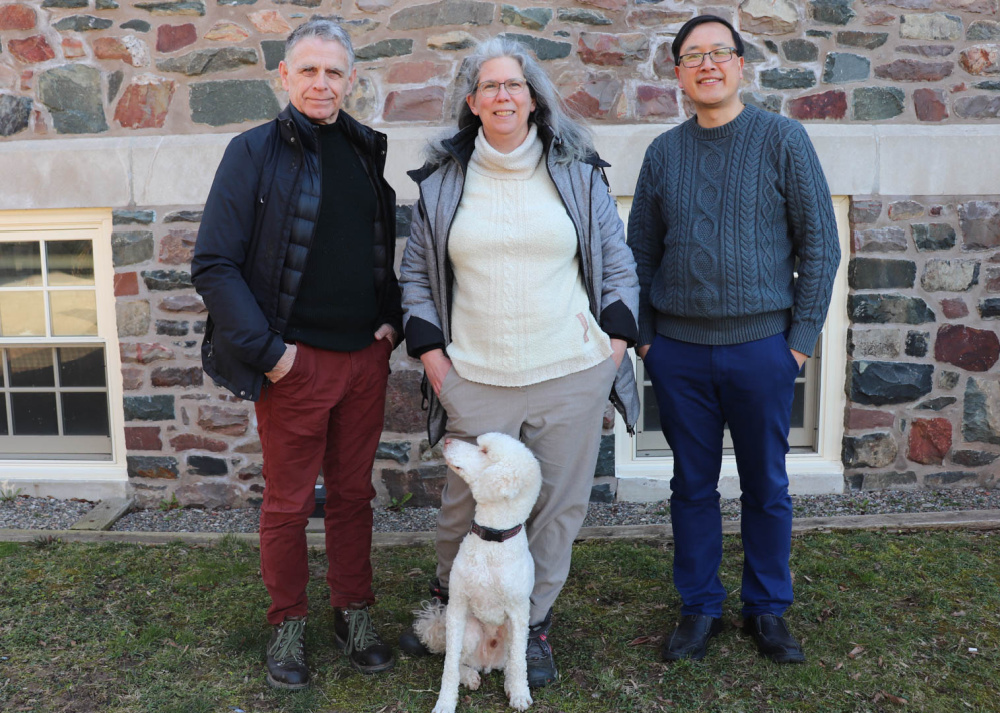In 2004, King’s hosted the Circulation of Knowledge conference. Co-organized by the Canadian Society for the History and Philosophy of Science, the British Society for the History of Science, as well as the History of Science Society, this conference set out to challenge the commonly held view that scientific knowledge was exclusively European in origin.
Now, twenty years later, the Circulation of Knowledge conference is returning to King’s, thanks to the work of a group of faculty members who have just been awarded a $25,000 grant from the Social Sciences and Humanities Research Council (SSHRC). Inglis Professor Gordon McOuat, Associate Professor of Humanities Mélanie Frappier and Professor of Humanities Simon Kow have been integral to planning this event, serving as the Program Committee Chair, Local Organizing Committee Chair and member of the Local Organizing Committee, respectively.
“The original conference [encouraged] us to start thinking about science as something organic and diverse, something that grows and is transformed as it moves from person to person and across places and time,” explains Frappier. “Something that develops not only in labs, but in households, ships, fields and forests.” While not present at the original conference, she describes its “fabulous aftermaths”: specifically, the birth of the projects Situating Science, and Cosmopolitanism and the Local in Science and Nature. “These two research networks really transformed the history and philosophy of science and made Canada one of the most important players in the field.”
The effects of this conference are still being felt at King’s two decades later. Nowadays, a cross-cultural view of science and knowledge is at the forefront of the educational curriculum with courses like Asia and the West: Centuries of Dialogue (taught by Kow), Science and Culture II: Resetting the Modern and a Foundation Year Program booklist that increasingly integrates non-Western perspectives.
As an Early Modern Studies professor, Kow believes the upcoming conference’s themes of the history and philosophy of science are applicable to all programs.
“The kinds of topics and papers that are being presented at this conference very much reflect the kind of cross-program collaboration that we’re trying to do between [the upper-year honours programs.]”
Circulating Knowledge 20 Years On will take place on King’s campus from August 7–10, and will see attendees from all over the world—including two keynote speakers who have visited King’s before.
Dr. James Secord, Emeritus Professor at the University of Cambridge, was a plenary speaker at the original conference.
“His paper ‘Knowledge in Transit’ tried to create a new paradigm on thinking about how knowledge moves around the world and across cultures, how we have to follow artifacts and translations,” McOuat explains. “It’s one of the most cited papers in in the area … We’re going to ask him to revisit it 20 years on, and see what’s happened since then.”
Another speaker, Dr. Sundar Sarrukai, delivered the 2017 MacLennan Lecture, “Science and the Rationality of the Social.” At the conference, he will speak on his most recent work on the circulation of knowledge. Other presentation topics include the importance of Arabic science in modernity and Māori knowledge.
The conference comprises three major segments: research, translation and pedagogy.
During the research portion, scholars will highlight the most recent work accomplished in the field. During translation, they will address what it means to translate, and how new translations of work can bridge gaps and introduce new forms of knowledge. For the pedagogy portion, there will be workshops designed to look at current curriculum and create collections of publications and texts that universities can use in the future.

Back row: Gordon McOuat, Mélanie Frappier, Simon Kow
Front row: Jasper
McOuat, Frappier and Kow also hope to introduce their international audience to some unique, Nova Scotia-specific activities that align with the themes of the conference. This includes an event at the Dalhousie Art Gallery during Mi’kmaw artist Alan Sylliboy’s exhibition, where elder Albert Marshall will deliver a talk about the concept of “two-eyed seeing.”
Thanks to the SSHRC grant, the conference will be able to hire students for the summer to help organize the event.
“We’re also, within the structure of the conference, setting up both mentoring and roundtable events,” says McOuat. “We asked every one of the senior scholars that are coming to this whether they want to be involved in a mentoring round table. So younger scholars, including undergraduates, will be able to attend and speak with highfalutin’ scholars to map out their pathway and be mentored.”
Perhaps most importantly, there will be no registration fee to attend the conference, opening it up to a wider audience of students and academics.
In addition to McOuat, Frappier and Kow, Assistant Professor Justina Spencer is serving on the Program Committee and Virtual Exhibit Curatorial Committee, and alum Megan Krempa, BA(Hons)’22, is the Conference Manager.
Keep an eye on ukings.ca and the conference website for more information.

